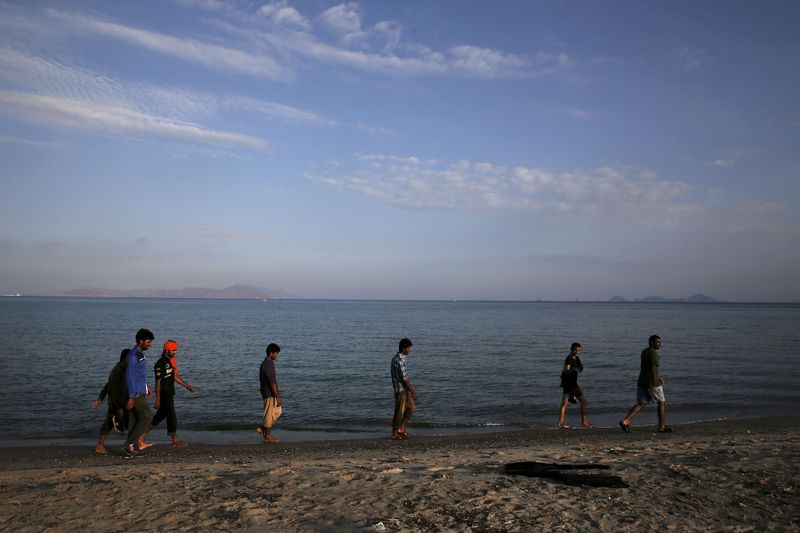By Michele Kambas
LESBOS, Greece (Reuters) - Father Efstratios Dimou knows all about physical suffering and his family has also known what it is to be a refugee. Now the Orthodox priest leads a small army of volunteers on the island of Lesbos tackling Greece's crisis within a crisis.
Despite suffering from lung cancer, Dimou - along with fellow volunteers from near and far - has toured the island offering people help that the Greek state, mired in a five-year debt crisis, can scarcely afford to provide any more.
Once Dimou's group Aggalia - Greek for "Embrace" - fed only the local poor, victims of the long economic depression.
But now Greece is struggling with what Prime Minister Alexis Tsipras has called a "humanitarian crisis within the economic crisis". He has acknowledged his cash-strapped government cannot cope with boatloads of migrants fleeing war and poverty who are crossing to the Greek islands from neighbouring Turkey.
So once again Aggalia is trying to fill the gap created by strained government resources.
"State services are virtually non-existent so volunteers are stepping in. We are doing as much as we can, but there are so many arrivals," said Dimou, known as "Papa Stratis", who is permanently hooked up to an oxygen tank because of his chronic respiratory condition.
Greece has become the biggest European gateway for migrants from the Middle East, Asia and Africa seeking a safer and better life. Numbers exceeded 135,000 this year at the last count, more even than those making the perilous crossing of the Mediterranean to Italy.
On Lesbos, local people often sympathise with the migrants' plight because among the population of about 75,000 are many descendents of refugees from Turkey.
Dimou, 57, himself is the third generation of a family that arrived as refugees. In the 1920s huge numbers of ethnic Greeks were forced out of Turkey, many settling on Greek islands such as Lesbos which lies in sight of the Turkish coast. Under this "population exchange", hundreds of thousands of Muslims living in Greece were forced to move in the opposite direction.
Dimou has long set off from his home town of Kalloni, touring the island in a sturdy old car he affectionately calls "Tarzan", helping where he can. "We fed 100 people today," he told Reuters. "We offer them love, a plate of food and hope."
TOURIST TURNS HELPER
Not all the volunteers are local. An hour's drive north of Kalloni, German Konny Noeske-Riggers turns up every morning at 6 am at a car park on the outskirts of a village with crates of juice, apples, sandwiches and water. And waits.
A group of about 40 people arrive within the hour, exhausted from the sea journey across the narrow stretch of water separating Lesbos from Turkey. They have just dodged the coastguard and sea currents for their journey into the unknown aboard inflatable dinghies.
People have long tried to cross the sea border but the figures have soared in the past five months due to upheaval in the Middle East and particularly the Syrian civil war.
Noeske-Riggers, a 60-year-old retired dietary consultant from the northern German town of Eutin, has returned to Lesbos for three months. "I was here as a tourist in May. There was something so wrong when I saw refugees chasing my tour bus, and they weren't allowed on," she told Reuters as she handed out turkey and cheese sandwiches to a group of Afghan arrivals in the village of Mithimna.
On Lesbos, migrants are taken to two reception centres run by Greek authorities, but where facilities are less than basic. Most services are offered by volunteers.
With few tents to go around, Reuters journalists saw families sleeping on cardboard at dawn as men huddled around fires. Later, they vied for shade from the blazing midday sun under olive trees as queues formed at clusters of taps where people washed clothes.
"We walked here," said Afghan Azadah Mohammad Hussein, 16, sitting in a tent outside Moria, an army barracks surrounded by razor wire which has been converted into a reception centre.
She and her family walked 50 km (30 miles) through mountains to get to the facility. "We had no food and we were drinking water, dirty water, from the ground," she said.
Tents surround the camp as its population exceeds the official capacity of 1,000 people.
Hussein was sharing a tent with her sister, parents and two other families. Water supplies are limited and food is delivered in a truck twice a day. "I missed it today," she said, as the sun set behind the hills surrounding the camp. "There wasn't any left."
STATE FAILURES
Tsipras has appealed for help from the European Union, which has failed to come up with a comprehensive policy to handle the crisis.
Eva Cosse, an Athens-based assistant researcher with Human Rights Watch, says Greece must share some blame for failing to tap 500 million euros in EU funding for immigration and asylum projects. But she also said EU countries had promised to resettle only "pitiful" numbers of asylum seekers.
One problem is that the migrants do not want to stay in Greece and are trying to travel on to wealthier countries in northern Europe where more help and jobs may be available.
Often the EU funds are earmarked for people seeking asylum, rather than those classified as economic migrants.
"The government cannot take funds to build reception centres for asylum seekers and then host people who don't apply for asylum. It's a tricky thing," Cosse said.

So in the meantime, volunteers such as Papa Stratis fill the void. "One day we helped reunite a Pakistani with his family who got separated on the road. We took to the streets until we found him. He was a Muslim, I'm a Christian priest and he hugged and kissed me," he said. "God is love. He doesn't know gender, race or borders."